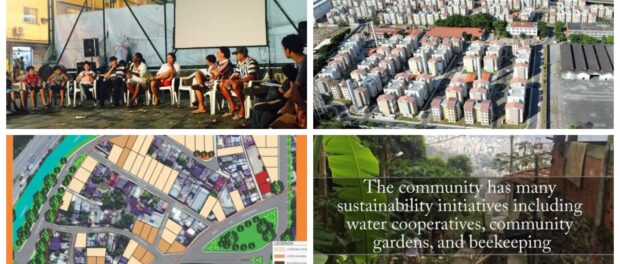
Clique aqui para Português
The media spotlight on Rio is growing ever more intense ahead of the Olympics, as October began with the official Rio 2016 press briefing for international journalists. The month included a number of notable themed days, from UN-Habitat’s World Habitat Day, to Blog Action Day 2015 exploring the theme of ‘Raise Your Voice’ and the UN’s World Cities Day with a focus on ‘Designed to Live Together.’ To help our readers digest the major news and themes of the past month, we’ve summarized the stories we published here on RioOnWatch along with a few other must-reads in the media. Access all our monthly summaries here and full digests here.
October brought more devastating ‘lightning evictions’ to Vila Autódromo, where five homes were demolished by the City without warning to residents. 22,059 families have been resettled since 2009, according to the City, which has served to further segregate an already divided city. The potential severe psychological effects caused by the destruction of a community have been documented in other eviction contexts. Yet some 50 Vila Autódromo families remain strongly determined to stay, continually updating the community’s People’s Plan for how they can co-exist with the Olympic Park next door.
As those families build their active media presence to denounce evictions, the growth of digital media is empowering people across the city to tell their stories. A video of police tampering with a shooting scene in Providência went viral on social media and within hours, drew global news coverage. The Popular Committee for the World Cup and Olympics used its active online network to publish and share its latest dossier, this one on violations of the right to sport. Appropriately, this year’s Blog Action Day focused on the theme, ‘Raise Your Voice.’ Favela-based journalists contributed pieces on the power of community journalism, as well as the censorship and threats that challenge it. We also highlighted the talented community photographers of the Imagens do Povo collective.
The participation of diverse perspectives in the media has been critical in the debate around beach robberies, vigilantism, and the police actions and bus route changes making it more difficult for Rio North Zone residents to get to the South Zone. One RioOnWatch article points out the irony of the government’s investment in digital inclusion in favelas just as police tactics and policies reinforce spatial exclusion.
Although dominant in mainstream media, the ongoing debate on beach security was far from the only important news story on police and security this month. Longitudinal research revealed that more Pacifying Police Unit (UPP) police officers perceived negative attitudes from residents toward the program in 2014 than in previous years. The complexity of life under the control of drug gangs has clearly not become any more simple under UPP authority. Meanwhile, Brazil’s prisons face a crisis of violence, intolerable conditions, and overcrowding. Security is complicated in Minha Casa Minha Vida (MCMV) public housing too, where residents struggle with the presence of traffickers and militias. Significant new financial burdens, poor infrastructure, and long commutes in MCMV housing risk reproducing social inequalities.
In contrast to struggling public housing condominiums, favelas like Asa Branca are thriving with projects to promote community integration. We featured Asa Branca in celebration of the World Cities Day theme, ‘Designed to Live Together,’ along with Vila Autódromo’s People’s Plan which has been continuously updated to live together with the Olympics, and Morro do Formiga, where community gardens and water societies enable residents to live together with the environment.
Environmental and sustainability projects like these and the sewage treatment biodigester in Vale Encantado, are increasingly important in Rio. Scientists predict Rio will be the worst affected by climate change of all cities in South America. These effects already disproportionately affect low-income peripheral neighborhoods as important research in Rio’s urban heat islands indicates.
In other local community news, this month also saw the conclusion of Complexo da Maré’s first-ever ‘Food of the Favela’ festival. Like the Afro-Rio Walking Tour of the Port Zone, the food festival highlights an oft-overlooked but important aspect of its locale’s culture and heritage. And finally, an event in Rocinha empowered residents to imagined what Rio would be like if they could participate fully in the decision-making processes affecting them. The reality of participation in Rio is not always so empowering, as highlighted by this satirical article.
Look out for our next summary of articles from November—Brazil’s Black Awareness Month. For more information and links to favela news from the month, see our full Favela Digest for October 2015 here. You can subscribe to receive the Favela Digest straight to your inbox each month here.
